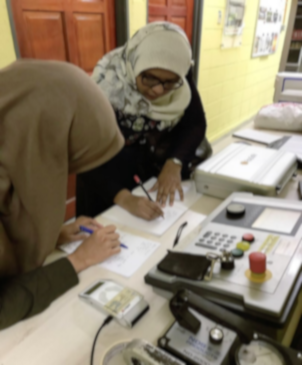
Alkhansa Mahmoud
Structural, Cell and Molecular Biology
A PhD fellow from Sudan making breast cancer cells more sensitive to radiation therapy
The main problem in radiotherapy is that most cancer cells are resistant to radiation.

Alkhansa Salih Mahmoud is a 2016 OWSD PhD fellow from Sudan who is currently completing a full-time fellowship at the Universiti Putra Malaysia (UPM). A PhD candidate in Cancer Biology and Oncology, her thesis research is focused on determining the effectiveness of a drug called octreotide acetate as a radiosensitizer in breast cancer cell lines.
Radiosensitizers are chemicals commonly used in radiotherapy treatment to make tumor cells more sensitive to DNA damage from radiation, enhancing the rate at which these cells are killed. Alkhansa hopes that her research can improve the outcome of targeted radiotherapy, which continues to be an important option in cancer treatment. “The main problem in radiotherapy is that most cancer cells are resistant to radiation,” she explains. By finding better drug candidates to act as radiosensitizers, her research can help to increase the benefit of such treatment while diminishing toxic side effects. “I am interested in this topic because cancer is a global disease,” she says.
Alkhansa learned about the OWSD fellowship via a subscription to a mailing list for postgraduate scholarships. “I am happy to be a full-time OWSD fellowship awardee,” she says. “This fellowship is really significant and has impacted my career a lot.”
During her PhD studies, she has been able to work on several different experiments, and her results have been published in journals including Genome Integrity, the Journal of Radiation Research and Applied Sciences, and the Journal of Diabetes and Obesity. At UPM, she has also been able to work under a partnership agreement with the Malaysian Nuclear Agency (MNA) in the agency’s biological X-ray irradiation unit to gain practical research experience. “The MNA is considered a leader in the application of radiation technologies with safety regulations,” she says. “I was surprised by the useful information I gained there that will benefit me in my career.”
Though her thesis research was set back by the COVID-19 pandemic, Alkhansa plans to graduate in the second half of 2022, and hopes to become an instructor for trainees in oncology and radiation biology. “I want to pass on what I learned during my PhD and to share knowledge with researchers around the world,” she says. “I also want to continue my scientific research in projects that support and promote capacity building in my home country.”










































